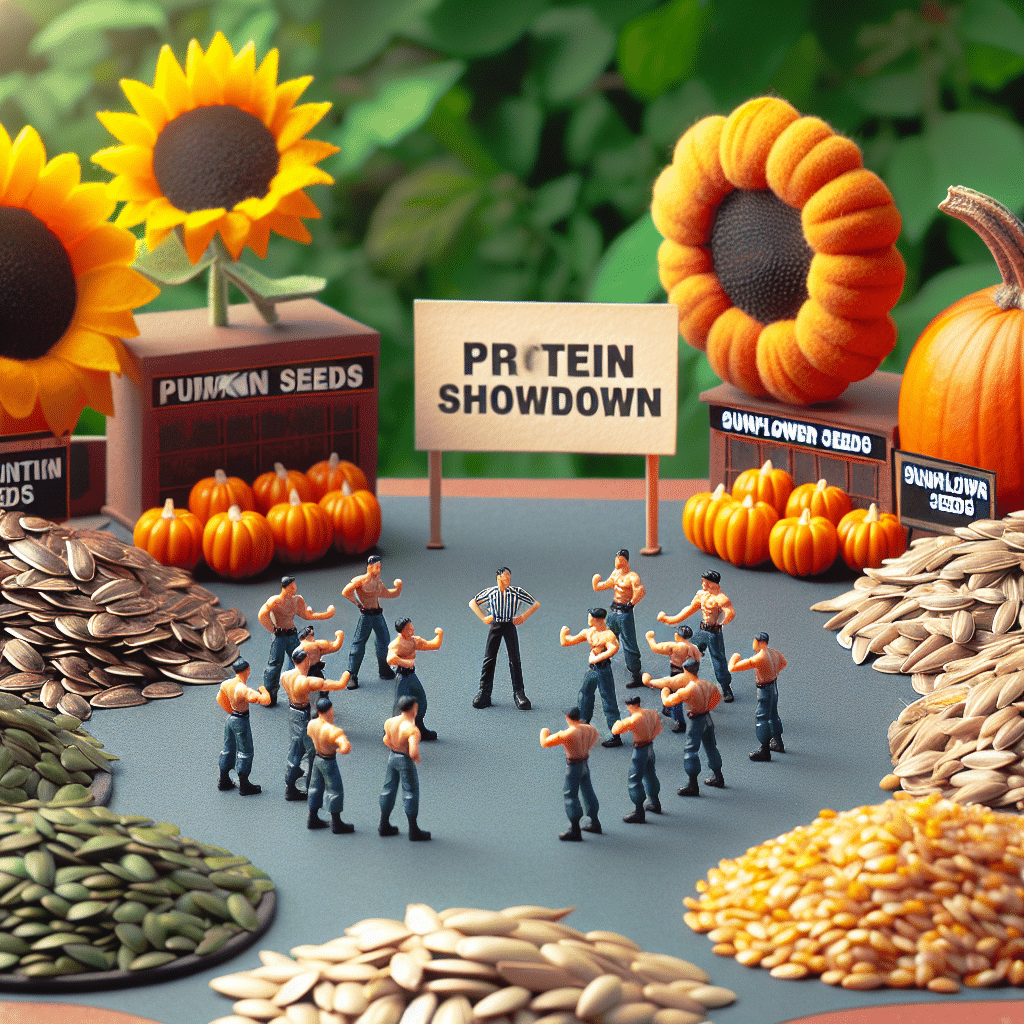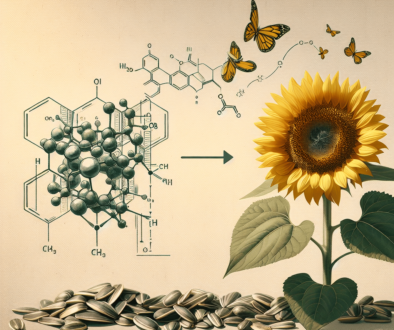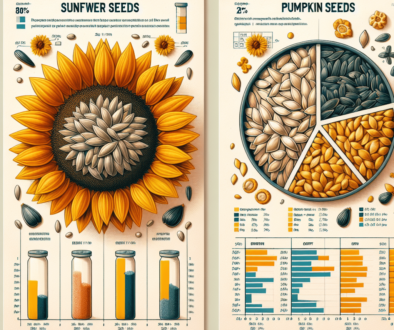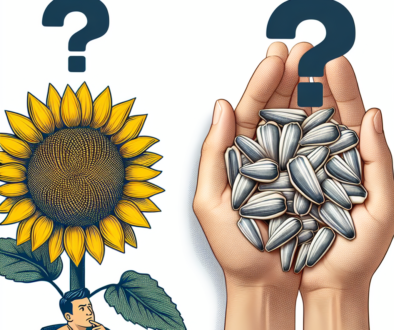Pumpkin vs Sunflower Seeds: Protein Showdown
-
Table of Contents
- Pumpkin vs Sunflower Seeds: Protein Showdown
- Understanding Protein in Seeds
- Nutritional Profile of Pumpkin Seeds
- Nutritional Profile of Sunflower Seeds
- Protein Quality and Digestibility
- Health Benefits of Seed Proteins
- Incorporating Seeds into Your Diet
- Case Studies and Research
- Conclusion: The Verdict in the Protein Showdown
- ETprotein: Your Source for High-Quality Seed Proteins
Pumpkin vs Sunflower Seeds: Protein Showdown

When it comes to plant-based proteins, seeds are often overlooked in favor of more popular sources like legumes and grains. However, seeds such as pumpkin and sunflower are nutritional powerhouses, packed with protein and other essential nutrients. In this article, we’ll dive into a detailed comparison of pumpkin and sunflower seeds, focusing on their protein content, nutritional benefits, and how they can be incorporated into a healthy diet.
Understanding Protein in Seeds
Proteins are vital for the body’s growth, repair, and maintenance. They are made up of amino acids, some of which are essential and must be obtained from our diet. Seeds are an excellent source of these essential amino acids, making them an important part of a balanced diet, especially for those following a plant-based lifestyle.
Nutritional Profile of Pumpkin Seeds
Pumpkin seeds, also known as pepitas, are the edible seeds of a pumpkin or certain other cultivars of squash. They are typically flat and asymmetrically oval, and have a green color encased in a beige shell. Here’s what they offer nutritionally:
- Protein Content: Pumpkin seeds are a good source of plant-based protein. On average, a 28-gram serving (about 1 ounce) contains approximately 7 grams of protein.
- Fiber: They are also high in dietary fiber, which aids in digestion and promotes a feeling of fullness.
- Healthy Fats: Rich in omega-3 and omega-6 fatty acids, pumpkin seeds contribute to heart health and reduce inflammation.
- Vitamins and Minerals: They are an excellent source of magnesium, zinc, iron, and other essential nutrients.
- Antioxidants: Pumpkin seeds contain antioxidants like carotenoids and vitamin E, which help protect the body against free radical damage.
Nutritional Profile of Sunflower Seeds
Sunflower seeds come from the center of the sunflower and have a firm but tender texture and a mild, nutty taste. They are commonly consumed as a snack, but can also be used in various recipes. Here’s a look at their nutritional benefits:
- Protein Content: Similar to pumpkin seeds, sunflower seeds are a good source of protein. A 28-gram serving contains about 6 grams of protein.
- Fiber: They provide dietary fiber, which is essential for good digestive health.
- Healthy Fats: Sunflower seeds are rich in monounsaturated and polyunsaturated fats, which are beneficial for heart health.
- Vitamins and Minerals: They are particularly high in vitamin E, selenium, and magnesium.
- Antioxidants: The high vitamin E content acts as an antioxidant, helping to fight inflammation and protect cells from damage.
Protein Quality and Digestibility
While both pumpkin and sunflower seeds are good sources of protein, the quality of protein is also an important factor to consider. Protein quality is determined by the presence and ratio of essential amino acids. Both seeds contain all nine essential amino acids, making them complete proteins, which is relatively rare for plant-based foods.
The digestibility of protein from seeds is generally lower than that of animal proteins. However, by incorporating a variety of protein sources in your diet, you can ensure that you’re getting a balance of essential amino acids and maximizing protein absorption.
Health Benefits of Seed Proteins
Consuming seeds as a source of protein offers numerous health benefits beyond just their amino acid content. Here are some of the advantages:
- Weight Management: The high fiber and protein content in seeds can help regulate appetite and reduce overeating.
- Heart Health: The healthy fats in seeds contribute to lower cholesterol levels and reduced risk of heart disease.
- Blood Sugar Control: Seeds have a low glycemic index and can help stabilize blood sugar levels.
- Muscle and Tissue Repair: The protein in seeds supports muscle growth and the repair of tissues in the body.
- Immune Function: The zinc found in seeds is crucial for immune system function and wound healing.
Incorporating Seeds into Your Diet
Both pumpkin and sunflower seeds are versatile and can be easily added to your diet in a variety of ways:
- As a snack: Eat them raw or roasted for a nutritious snack.
- In salads: Sprinkle seeds on top of salads for added crunch and nutrients.
- In baking: Add seeds to bread, muffins, or cookies for texture and flavor.
- As a topping: Use seeds as a topping for yogurt, oatmeal, or smoothie bowls.
- In homemade granola or energy bars: Mix seeds with oats, nuts, and dried fruit to make a healthy snack.
Case Studies and Research
Several studies have highlighted the benefits of seed consumption. For instance, research has shown that diets rich in seeds are associated with a lower risk of cardiovascular disease, type 2 diabetes, and obesity. Additionally, studies on pumpkin seed protein have indicated potential benefits for prostate health and bladder function.
Conclusion: The Verdict in the Protein Showdown
In the showdown between pumpkin and sunflower seeds, it’s clear that both are winners in their own right. They offer similar amounts of high-quality protein along with a host of other nutritional benefits. The choice between them can be based on personal preference, dietary needs, or simply the desire to add variety to your diet.
Ultimately, incorporating a mix of both pumpkin and sunflower seeds into your diet is a smart way to take advantage of their unique nutritional profiles. Whether you’re looking to boost your protein intake, improve your heart health, or simply enjoy a tasty snack, these seeds are a valuable addition to any eating plan.
ETprotein: Your Source for High-Quality Seed Proteins
If you’re looking to incorporate more plant-based proteins into your diet, ETprotein offers a range of high-quality seed protein products. Their pumpkin seed protein and sunflower seed protein are perfect for those seeking organic, non-GMO, and allergen-free options. Whether you’re a manufacturer, trader, or just someone looking to improve your health with plant proteins, ETprotein has you covered.
About ETprotein:
ETprotein, a reputable protein Chinese factory manufacturer and supplier, is renowned for producing, stocking, exporting, and delivering the highest quality organic bulk vegan protein and plant proteins. They include Organic rice protein, clear rice protein, pea protein, clear pea protein, pumpkin seed protein, sunflower seed protein, mung bean protein, etc. Their offerings, characterized by a neutral taste, non-GMO, allergen-free attributes, cater to a diverse range of industries. They serve nutraceutical, pharmaceutical, cosmeceutical, veterinary, as well as food and beverage finished product distributors, traders, and manufacturers across Europe, USA, Canada, Australia, Thailand, Japan, Korea, Brazil, and Chile, among others.
ETprotein specialization includes exporting and delivering tailor-made protein powder and finished nutritional supplements. Their extensive product range covers sectors like Food and Beverage, Sports Nutrition, Weight Management, Dietary Supplements, Health and Wellness Products, and Infant Formula, ensuring comprehensive solutions to meet all your protein needs.
As a trusted company by leading global food and beverage brands and Fortune 500 companies, ETprotein reinforces China’s reputation in the global arena. For more information or to sample their products, please contact them and email sales(at)ETprotein.com today.














